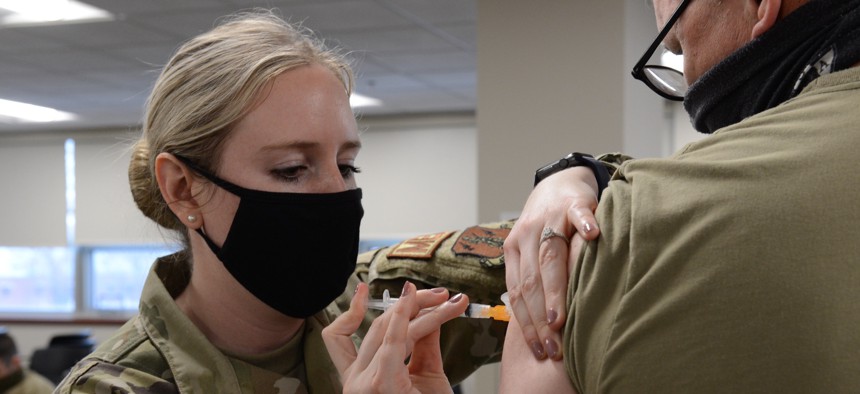
Staff Sgt. Megan Rose, (left), 155th Medical Group nurse, gives a COVID-19 vaccination dose to a Nebraska Air National Guard volunteer, Jan. 10, 2021, at the 155th Air Refueling Wing in Lincoln. Nebraska Air National Guard / Tech. Sgt. R. Denise Mommens
State Guards’ Vaccine Refusal Sets Up Fight with Feds
Six governors are rejecting the Pentagon’s order to inoculate their troops against COVID. Is a lawsuit next?
Six states are now rejecting the Defense Department’s order requiring all members of the National Guard to be vaccinated against COVID-19, arguing that Defense Secretary Lloyd Austin’s mandate exceeds his constitutional authority. Legal experts who are closely watching the challenge said it's likely headed to the courts.
In a joint letter Tuesday, the governors of Alaska, Iowa, Mississippi, Nebraska, and Wyoming—all Republicans—asked Austin to rescind decisions by the Air Force and Army to eject service members who refuse to get the vaccine.
“Directives dictating whether training in a Title 32 status can occur, setting punishment requirements for refusing to be COVID-19 vaccinated, and requiring separation from each state National Guard if unvaccinated are beyond your constitutional and statutory authority,” wrote the governors.
They also ask Austin to reverse the Pentagon’s decision not to fund training for National Guard members who refuse the vaccine, which also ultimately ends the military careers of those service members.
The governors’ letter echoes a similar request sent last month by the Oklahoma governor, which Pentagon leaders swiftly rejected.
In the end, it’s a question of whether DOD has the power to require the vaccines or whether the governors have control of their state National Guard units.
“We have received the letter from the five governors and will respond in due course,” Pentagon press secretary John Kirby said in an emailed statement.
Most National Guard members are not full-time soldiers. They typically work in other full-time jobs but can be activated under federal Title 10 orders to deploy overseas to support military operations, or under state Title 32 orders to respond to a local disaster. This week, Kentucky sent several hundred of its National Guard members to help with tornado recovery efforts.
Military law experts said there was a high chance the vaccine dispute will be decided in the courts. They were split on whether the Defense Department or states would prevail.
“I have very little doubt that the federal government is going to get an injunction” from one of the states to challenge its decision to no longer fund training, said Anthony Kuhn, a managing partner at the Tully Rinckey law firm and a New York State Army reservist who specializes in military law.
Kuhn said it is his view that the Defense Department lacks the authority to require the vaccine for National Guard troops.
“I think we are going to find out through court battles it's an abuse of their power,” said Kuhn, adding that his firm now has several hundred service members as clients challenging the vaccine mandate.
But Eugene Fidell, a military law professor at the NYU School of Law, said he thought the Pentagon would likely prevail.
“I think litigation is likely because these governors are just hell-bent on making an issue of this,” Fidell said. “It’s extremely doubtful in my mind that the modest steps the Pentagon has taken will be overturned.”
Retired Air Force two-star Charlie Dunlap, executive director at the Center on Law, Ethics and National Security at the Duke University School of Law, also said he thought the Pentagon had the authority to require vaccines. If the states want a force completely under their own authority, they should form a militia, he said.
Austin “has the legal authority to require members of the National Guard to meet certain vaccination standards,” Dunlap said. “If a governor wants a ‘militia’ force free from all federal requirements, they can establish – and fund – their own state defense force separate from the Guard, but no federal money or equipment would flow to it.”







